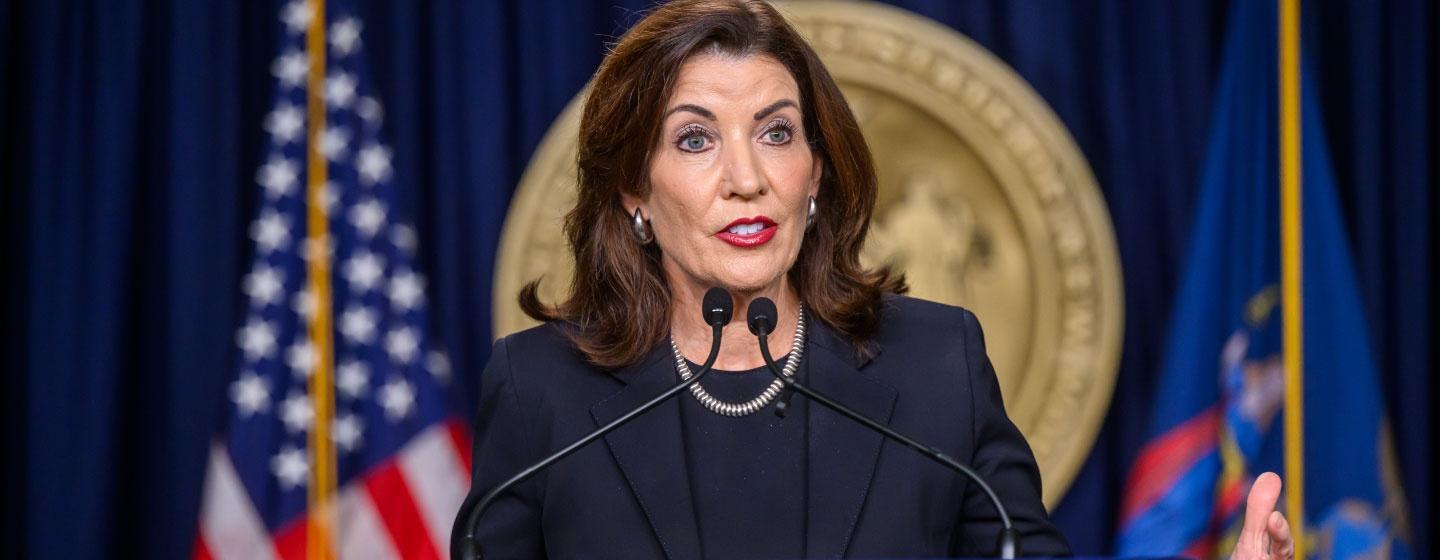Hochul Vetoes Grieving Families Act for a Third Time

For the third year in a row, Governor Kathy Hochul vetoed the Grieving Families Act that would have given families in the state the ability to sue for wrongful death damages based on emotional anguish, suffering, and grief.
Currently, state law only allows wrongful death suits to hand out damages based on economic or pecuniary loss. New York is one of only two states in the country with such a legal statute.
For New York resident, Bruce McIntyre — currently engaged in a wrongful death lawsuit against Montefiore Medical Center — this news was incredibly frustrating.
The Governor’s veto message states concerns for the health industry’s financial well-being.
McIntyre said in response to the veto, the Governor is ignoring families like his and the racial bias his family faced while trying to have a healthy baby.
“Her words of compassion in the veto message they just really felt empty,” he said. “The veto message cites concerns about the financial well-being of the healthcare system prompting one
critical question–how many patients are losing their lives in the hospitals for this bill to be seen as a threat to financial stability? These are preventable deaths that are caused by negligence.”
McIntyre has been advocating for this legislation for five years following the death of his partner Amber Rose Isaac.
26-year-old Isaac died on April 21, 2020, during childbirth. She had a rare and life-threatening pregnancy complication called HELLP syndrome that can cause blood and liver problems if left untreated.
McIntyre said throughout their pregnancy, they felt ignored by their physicians.
“Her health was deteriorating, her breathing was getting really bad, and she was having headaches. She just wasn’t feeling right. She would raise these concerns with her OBGYN, and they would just be brushed off and taken lightly. It would be brushed off as regular related systems to pregnancy,” he said.
McIntyre said she constantly advocated for herself because something didn’t feel right.
He said they tried multiple hospitals to find a place where they felt listened to. They settled on Montefiore Medical Center.
McIntyre said leading up to the birth of his son Elias, Amber’s platelets were deteriorating. The doctors told him she could have COVID or pre-eclampsia.
Two days after they were admitted into the hospital they finally found an answer diagnosing her with HELLP syndrome.
“Her blood was not clotting and her blood was becoming more and more water-like,” he recounted.
The day Elias was born, McIntyre said after doctors reviewed delivery and treatment options with them they left the room and returned with a sense of urgency rushing Amber into a c-section.
“They brought me out of the room and brought her to a different room and told me she’d be back in twenty minutes. Unfortunately, that was the last time I saw Amber alive, and her last words to me were ‘All three of us are gonna go home.’” he said.
The lawsuit against the hospital alleges doctors missed multiple signs of HELLP syndrome.
McIntyre said it’s been a very frustrating process–which could have been helped by the Grieving Families Act.
“There’s not gonna be any accountability for people that were neglecting Amber and are still working in the hospital. My lawyer is basically telling me there’s not going to be any type of real accountability. That’s really disheartening to hear because Amber had so much to give,” he said.
McIntyre added Amber was an amazing and incredible woman who was about to earn her master's degree before she died in childbirth.
“That’s something that has been taken from us and that’s something that we’re going to have to live with for the rest of our lives. My son is going to have to grow up not knowing who his mother is for the rest of his life,” he said.
A spokesperson from Montefiore said they are not able to share information due to pending litigation, HIPAA regulations, and patient privacy rules.
McIntyre isn’t alone, many families struggle with wrongful death lawsuits.
The state law currently only allows damages for economic loss such as wages in a wrongful death lawsuit.
Victoria Wickman, president of the New York State Trial Lawyers Association said families and victims of negligent deaths should be able to look to the law and to the courts for justice, accountability, and meaningful compensation.
“New York stands along the state of Alabama as the only two states in the country that do not yet permit families to recover for their grief,” said Wickman.
Wickman adds this law would also help address racial disparities. She highlighted the increasing rate at which Black women die from pregnancy or childbirth compared to women.
New York in particular has concerning data around maternal mortality. According to a 2023 report from the New York State Department of Health, Black women are four times more likely to die in pregnancy or childbirth than white women.
“There’s no medical explanation for that,” she said. “Women are women no matter what the color of their skin is. The only answer for that is the racial disparity and bias that’s inherent in the medical industry.”
Some lawmakers agree this veto is unfair and missed an opportunity to help address racial disparities.
“New York’s wrongful death law is a stark reminder of the systemic racism and injustice that continue to harm communities of color," Sen. Cordell Cleare said in an official statement.
Sen. Cleare added the veto is a step backward.
"Enacted during a time when more than half our country lacked fundamental rights and freedoms, this discriminatory statute remains unchanged today, a dark stain on our state’s legacy. For generations, this law has denied families the opportunity for fair compensation and accountability, disproportionately impacting Black and Brown New Yorkers, including victims of maternal and infant mortality," she wrote.
Organizations that support the veto are in line with the Governor’s veto message outlining economic concerns about the impact on healthcare and insurance companies.
"Consumers and small businesses in New York are already feeling the pain of inflation. This legislation would add to that financial pressure through runaway litigation costs that primarily
benefit plaintiffs' lawyers and ultimately harm consumers through higher insurance prices,” said Chris Nicolopoulos, senior regional vice president, Northeast, for the National Association of Mutual Insurance Companies.
Some lawmakers argued these economic concerns are widely disproven.
“The myth that improving patient safety raises insurance premiums has been debunked. In fact, this is the most profitable year in history for insurers,” stated Sen. Brad Holyman Sigal in an official press release.
According to a recent report from the U.S. Department of Treasury, the insurance industry nationwide has seen a record high in profitability.
The report stated in 2023, insurance companies in varying sectors totaled $1.9 trillion from direct premiums profits, representing an eight percent annual increase.
While this is the third veto for this legislation, lawmakers are not ready to give up. Multiple lawmakers and legislative leaders have said they plan to continue the fight to end this nearly 180-year-old legal statute.

Photos courtesy of Bruce McIntyre.

Photos courtesy of Bruce McIntyre.

Photos courtesy of Bruce McIntyre.

Photos courtesy of Bruce McIntyre.
Related

New York Bans Sales of Certain New Apparel Containing PFAS ‘Forever Chemicals’
New York has banned the sale of certain new apparel containing PFAS, also known as “forever chemicals”. The law went into effect on Jan. 1, 2025.


